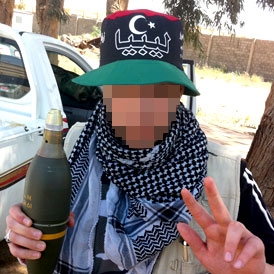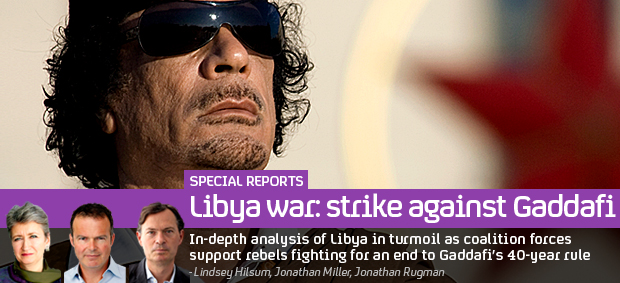The teenage Libyan rebel from Manchester
As Libyans in Britain anxiously watch events in their homeland, a few choose to return and fight with the rebels. Jane Deith has been talking to one of them.
When the people of the eastern city of Benghazi rose up against Colonel Gaddafi’s rule, his son Saif was straight on Libyan state television, warning viewers that the uprising was the work of Libyans in the west who wanted to invade and steal the country’s oil.
And when he spoke of “Libyans in the west”, Saif Gaddafi included Manchester in his list.
He’s right that there are thousands of Libyans in Manchester who hate the Gaddafi regime. The city is home to Britain’s largest Libyan community. Almost every elder you meet fled Libya in the last 20 years, warned that they would be arrested or killed if they stayed, simply for calling for change.
They fled west in terror. But now they sense Gaddafi could finally be beaten; they’re not afraid any more. And they are daring to go back – some to find family, others to help the rebels. Some to fight alongside them.
I was given an exclusive interview with a Manchester teenager who has sworn to risk his life fighting to overthrow Gaddafi.
“I’m not really scared – I would gladly any day die for my country.” Manchester teenager
He’s a 19-year-old college student. He was raised in Britain. But his father is Libyan and is in Tripoli now. To protect them both, we’re not showing his face or giving his name. But we have an exclusive video which shows his training with a unit of the rebel army called the Tripoli Brigade. His training – in Benghazi – took two months.
Briefly back home to sit his exams – and to see his mother – he told me there were other rebel recruits from Manchester – and the west.
“We were training on how to to use the guns and weaponry and big anti-aircraft guns, so hopefully when I do return I’ll be sent to the front line with my brothers,” he told me.
“Are you scared,” I asked. “You face the risk you could die out there.”
“I’m not really scared – I would gladly any day die for my country – it’s my country and I would do anything for my country,” he replied.

I asked his mother how it made her feel when she heard her son talking about taking up arms, carrying rifles.
“I can honestly say if I had ten sons I would gladly send them all to do what is right and fair and fight against someone who is such an animal and a murderer – I’d be proud to send all the members of my family,” she said.
Not everyone’s going to fight, but everywhere I went in Manchester, I met people who’d been to Libya and met the rebels. In the barber shop, a man was getting a haircut after a trip to take supplies – communication equipment he said – to the rebels.
The Foreign Office doesn’t know how many like him are in Libya – but more and more families are asking for help as men go missing.
Because it’s a risky trip. To be caught by Gaddafi’s men carrying a British passport carries a risk of arrest – or worse.
At Didsbury mosque the imam who leads the prayers is missing. He’s sitting in a squalid prison in Tripoli.
Three months ago, Sheikh Mustafa Graf went to Libya to help his parents escape. His brother-in-law Ahmed Ben Ramadan told me he was arrested.
For two months his wife and children didn’t know where he’d been taken, or even if he was still alive. Until a cell mate got out of prison and rang to say he was OK.
“In the process of leaving the country he got held on the border,” said Ramadan. “Obviously we don’t know why, but we know he had his English passport with him…It’s just the fact that he’s British.
“The cell mate told us he is in a cell with 12 people – cells usually hold 3 to 4 people – we know he only gets one meal a day – bread and water, rice if he’s lucky.”
Had he been told why he’d been put in jail?
“No no-one knows why. Literally nobody in prison would have any idea why they have been put in prison.”
Ahmed Ben Ramadan introduced me to two of his friends.
Malik Tabib’s father was imprisoned, by security forces who accused him of telling lies about Gaddafi. Ahmed Taghdi is mourning his father.
Khaled Taghdi went to rescue his daughter Fatima from Tripoli. On the way, he was staying in a rebel town, when it was bombed.
“He had some friends in Benghazi so he stayed with them for a while and then he was making his way to Tripoli, and Gaddafi’s military attacked the place were he was and he got killed,” said Ahmed Taghdi.
“I have been to Libya and seen all the corruption, all that’s wrong with the country. And when my dad passed away I was driven even more – I just want to see the regime come to an end.”
Malik Tabib said that anyone connected with Britain or the west was at risk if they went back to Libya.
“But I think people here, they’re not afraid any more,” he added. “They want to go back. They want to be able to say they were there when change took place.”
In Manchester they’re willing Gaddafi to go. Until then, a new charity, Libya Relief, is raising money for refugees who’ve fled.
The imam Sheikh Mustafa Graf still waits to be interrogated.
And next week, the teenage fighter will be heading for the front line near Tripoli.
